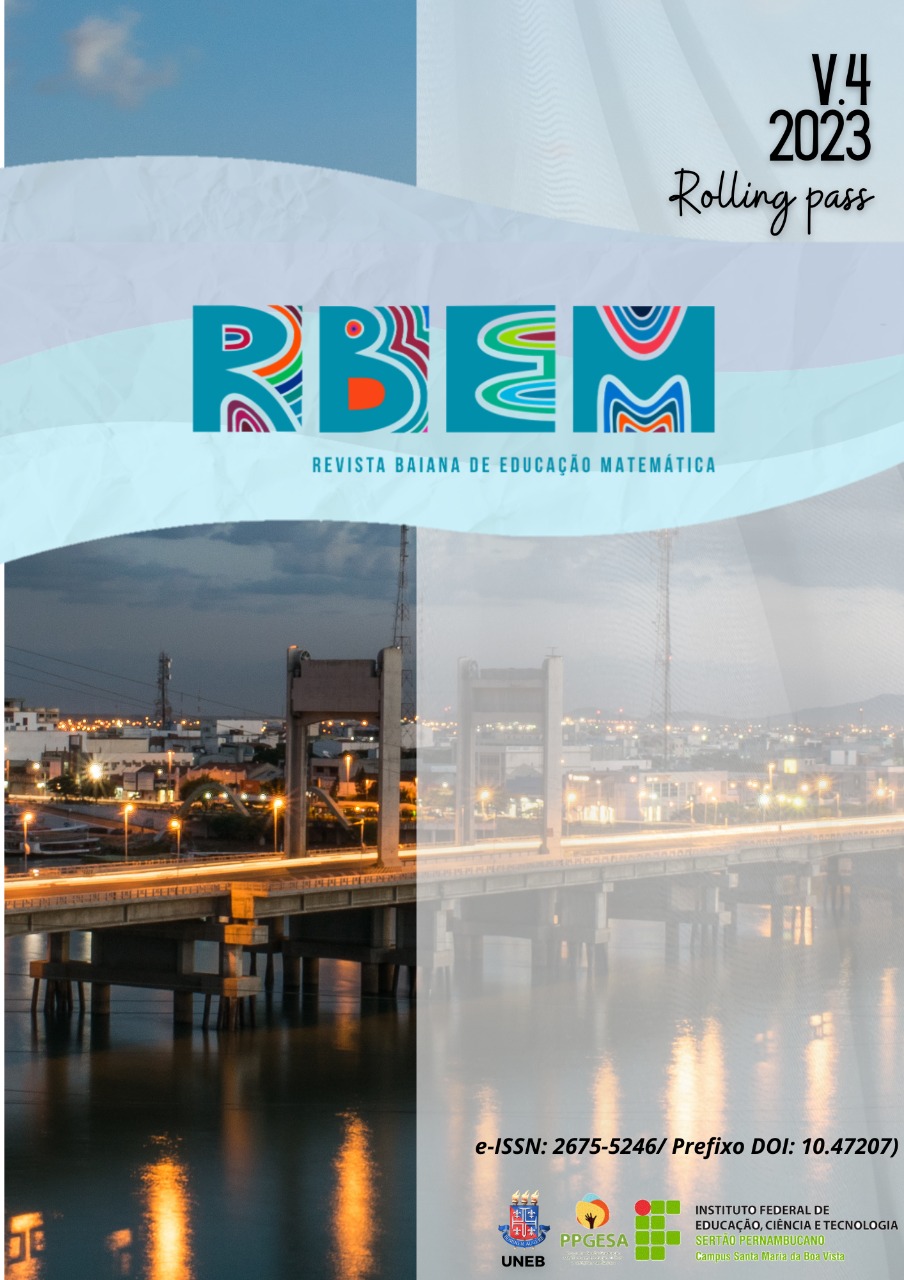Problem solving on cube Planning: an approach through concrete materials
Main Article Content
Abstract
This article reports on the experimental activity called "Problem-solving on cube planning: an approach using manipulatives", which was proposed to students in the subject Mathematics Teaching Methodology. The aim of the work was to obtain the plannings of the cube using manipulable materials. The suggested activity consisted of constructing the cube and deconstructing it in order to visualize it on the plane. In addition, problems involving this content were given in order to allow the student to interact with the plannings. The discussion around these problems was very productive. The results showed that the activity encouraged the search for new teaching strategies, in order to make the learning process meaningful for basic education students. From the discussions, it was possible to see that the task contributed to improving the initial training of undergraduate mathematics students. Thus, when proposing a challenge to students, it is necessary to develop strategies for understanding the problem and establish creative ways of finding solutions that can use manipulable materials.
Downloads
Article Details

This work is licensed under a Creative Commons Attribution-NonCommercial-ShareAlike 4.0 International License.
Uma nova publicação de artigo anteriormente publicado na Revista Baiana de Educação Matemática, fica sujeita à expressa menção da precedência de sua publicação neste periódico, seguindo as normas de referência. Autores que publicam na RBEM concordam com os seguintes termos:
-
O Conselho Editorial se reserva ao direito de efetuar, nos originais, alterações de ordem normativa, sintática, ortográfica e bibliográfica com vistas a manter o padrão culto da língua, respeitando, porém, o estilo dos autores. As provas finais poderão ou não ser enviadas aos autores.
-
Autores mantém os direitos autorais e concedem à revista o direito de primeira publicação, com o trabalho simultaneamente licenciado sob a Licença Creative Commons Attribution (CC BY-NC-SA).
-
Autores têm autorização para assumir contratos adicionais separadamente, para distribuição não-exclusiva da versão do trabalho publicada nesta revista, exemplo: publicar em repositório institucional ou como capítulo de livro, com reconhecimento de autoria e publicação inicial na RBEM.
-
Autores têm permissão e são estimulados a publicar e distribuir seu trabalho online — em repositórios institucionais, página pessoal, rede social ou demais sites de divulgação científica.
References
ALLEVATO, Norma Suely Gomes; ONUCHIC, Lourdes de La Rosa. As conexões trabalhadas através da Resolução de Problemas na formação inicial de professores de Matemática. Revista de Ensino de Ciências e Matemática, [S.L.], v. 10, n. 2, p. 1-14, 3 jun. 2019. Cruzeiro do Sul Educacional. http://dx.doi.org/10.26843/rencima.v10i2.2334.
BELTRÃO, Isabel do Socorro Lobato; KALHIL, Josefina Barrera; BARBOSA, Ierecê dos Santos. PIBID MATEMÁTICA: contribuições para a formação docente. Reamec - Rede Amazônica de Educação em Ciências e Matemática, [S.L.], v. 5, n. 1, p. 78-93, 12 jul. 2017. Revista REAMEC. http://dx.doi.org/10.26571/2318-6674.a2017.v5.n1.p78-93.i5344.
BRASIL. Conselho Nacional de Educação. Diretrizes Curriculares Nacionais para os Cursos de Matemática, Bacharelado e Licenciatura. Parecer CNE/CES 1.302/2001. Diário Oficial da União, Seção 1, p. 15 de 5 de março de 2002. Disponível em: http://portal.mec.gov.br/cne/arquivos/pdf/CES13022.pdf. Acesso em: 5 abr. 2023.
BRASIL. Ministério da Educação. Secretaria de Educação Básica. Diretoria de Currículos e Educação Integral. Diretrizes Curriculares Nacionais Gerais da Educação Básica. Brasília: MEC/SEB/DICEI, 2013. Disponível em: http://portal.mec.gov.br/index.php?option=com_docman&view=download&alias=13448-diretrizes-curiculares-nacionais-2013-pdf&Itemid=30192. Acesso em: 5 abr. 2023.
BRASIL. Ministério da Educação. Base Nacional Comum Curricular. 2018. Disponível em: http://basenacionalcomum.mec.gov.br/. Acesso em: 5 abr. 2023.
CORREIA, Vinícius Christian Pinho; BRITO, Mirian Ferreira de. Materiais Didáticos Manipuláveis para o Ensino de Geometria: uma Perspectiva para o Sexto Ano do Ensino Fundamental. Revista Baiana de Educação Matemática, [S. l.], v. 3, n. 01, p. e202203, 2022. https://doi.org/10.47207/rbem.v3i01.14299
GONORING, Cecilia Luzia Belardt. ENSINO E APRENDIZAGEM DE POLIEDROS COM MATERIAIS MANIPULATIVOS. Revista Eletrônica Sala de Aula em Foco, [S.L.], v. 8, n. 1, p. 80-91, 12 fev. 2020. IFES – Instituto Federal do Espirito Santo. http://dx.doi.org/10.36524/saladeaula.v8i1.521.
POLYA, George. A arte de resolver problemas: um novo aspecto do método matemático. Tradução e adaptação Heitor Lisboa de Araújo. 2. reimpressão. Rio de Janeiro: Interciência, 1995.
EXAME NACIONAL DO ENSINO MÉDIO (ENEM). Disponível em: < https://www.gov.br/inep/pt-br/areas-de-atuacao/avaliacao-e-exames-educacionais/enem>. Acesso em: 29 de mar. 2023.
GEOMETRY NETS HELPER. Disponível em: <https://digital-gene.com/app_geometrynets.php?lang=en>. Acesso em: 28 de abr. de 2023.
GERVÁZIO, Suemilton Nunes. Materiais concretos e manipulativos: uma alternativa para simplificar o processo de ensino/aprendizagem da matemática e incentivar à pesquisa. C.Q.D. – Revista Eletrônica Paulista de Matemática, [S.L.], v. 9, p. 42-55, jul. 2017. C.Q.D.- Revista Eletrônica Paulista de Matemática. http://dx.doi.org/10.21167/cqdvol9201723169664sng4255.
GRANDO, Regina Célia. RECURSOS DIDÁTICOS NA EDUCAÇÃO MATEMÁTICA: jogos e materiais manipulativos. Revista Eletrônica Debates em Educação Científica e Tecnológica, [S.L.], v. 5, n. 02, p. 393-416, 27 set. 2019. IFES – Instituto Federal do Espírito Santo. http://dx.doi.org/10.36524/dect.v5i02.117.
OLIMPÍADA BRASILEIRA DE MATEMÁTICA DAS ESCOLAS PÚBLICAS (OBMEP). Disponível em: <http://www.obmep.org.br/apresentacao.htm>. Acesso em: 29 de mar. de 2023.
PONTES, Edel Alexandre Silva. A arte de ensinar e aprender matemática na educação básica: um sincronismo ideal entre professor e aluno. Revista Psicologia & Saberes, v. 7, n. 8, 163-173, 2018. https://revistas.cesmac.edu.br/psicologia/article/view/776.
SILVA, Juliana Lins da; COSTA, Michel da; SILVA, Aparecido Fernando da: TAVARES, Elisabeth dos Santos. Práticas pedagógicas com uso de materiais manipuláveis: possibilidades nos anos iniciais do ensino fundamental sob a ótica da BNCC. Revista Ágora. Unimes Virtual. Vol.3 – Número 6 – Dez. 2019/Jan.2020. https://periodicos.unimesvirtual.com.br/index.php/formacao/issue/view/114
SKOVSMOSE, Ole. Cenários para investigação. Boletim de Educação Matemática, Rio Claro – São Paulo, v. 13, n. 14, 2000. https://www.periodicos.rc.biblioteca.unesp.br/index.php/bolema/article/view/10635.

